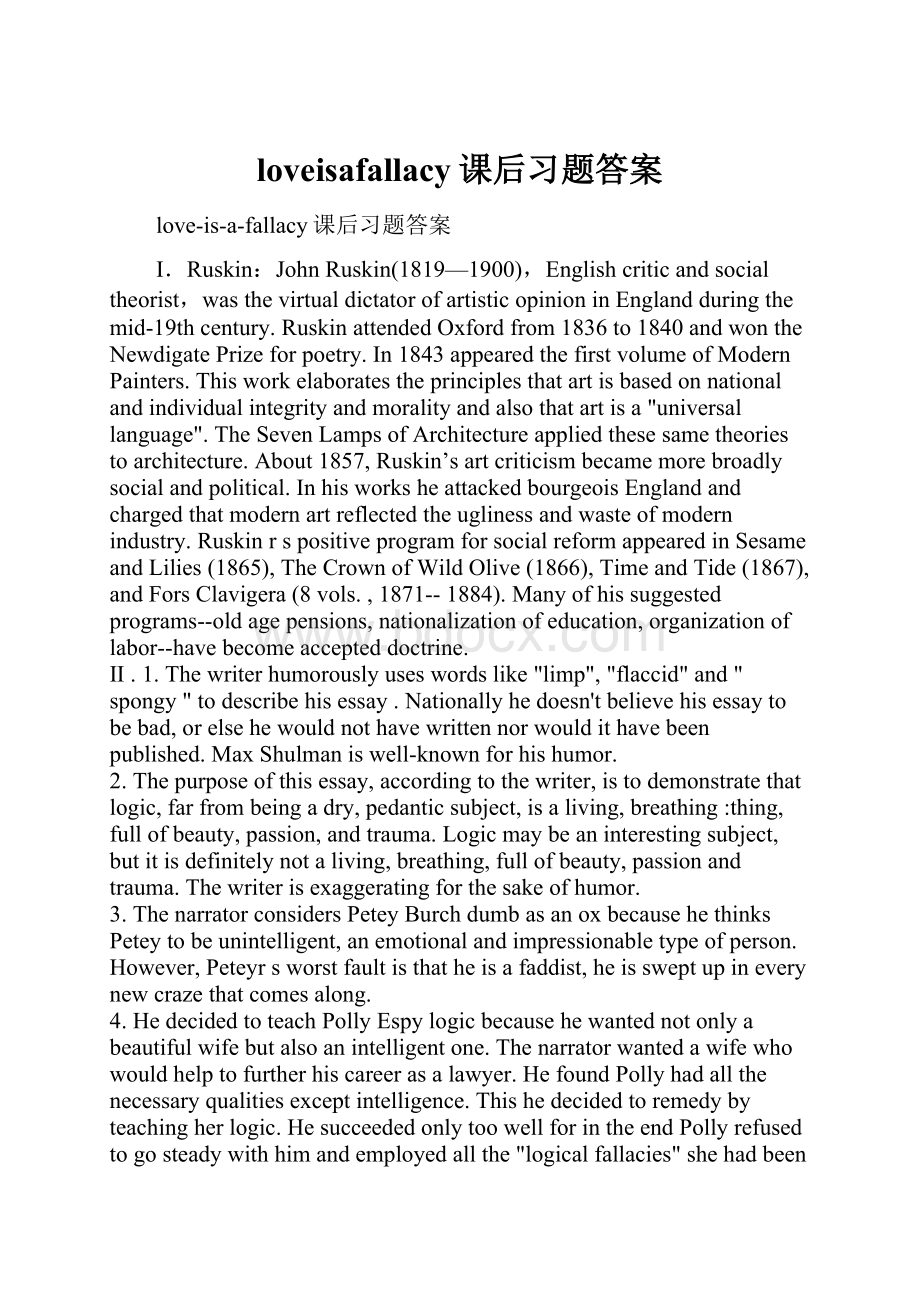loveisafallacy课后习题答案.docx
《loveisafallacy课后习题答案.docx》由会员分享,可在线阅读,更多相关《loveisafallacy课后习题答案.docx(9页珍藏版)》请在冰豆网上搜索。

loveisafallacy课后习题答案
love-is-a-fallacy课后习题答案
Ⅰ.Ruskin:
JohnRuskin(1819—1900),Englishcriticandsocialtheorist,wasthevirtualdictatorofartisticopinioninEnglandduringthemid-19thcentury.RuskinattendedOxfordfrom1836to1840andwontheNewdigatePrizeforpoetry.In1843appearedthefirstvolumeofModernPainters.Thisworkelaboratestheprinciplesthatartisbasedonnationalandindividualintegrityandmoralityandalsothatartisa"universallanguage".TheSevenLampsofArchitectureappliedthesesametheoriestoarchitecture.About1857,Ruskin’sartcriticismbecamemorebroadlysocialandpolitical.InhisworksheattackedbourgeoisEnglandandchargedthatmodernartreflectedtheuglinessandwasteofmodernindustry.RuskinrspositiveprogramforsocialreformappearedinSesameandLilies(1865),TheCrownofWildOlive(1866),TimeandTide(1867),andForsClavigera(8vols.,1871--1884).Manyofhissuggestedprograms--oldagepensions,nationalizationofeducation,organizationoflabor--havebecomeaccepteddoctrine.
Ⅱ.1.Thewriterhumorouslyuseswordslike"limp","flaccid"and"spongy"todescribehisessay.Nationallyhedoesn'tbelievehisessaytobebad,orelsehewouldnothavewrittennorwouldithavebeenpublished.MaxShulmaniswell-knownforhishumor.
2.Thepurposeofthisessay,accordingtothewriter,istodemonstratethatlogic,farfrombeingadry,pedanticsubject,isaliving,breathing:
thing,fullofbeauty,passion,andtrauma.Logicmaybeaninterestingsubject,butitisdefinitelynotaliving,breathing,fullofbeauty,passionandtrauma.Thewriterisexaggeratingforthesakeofhumor.
3.ThenarratorconsidersPeteyBurchdumbasanoxbecausehethinksPeteytobeunintelligent,anemotionalandimpressionabletypeofperson.However,Peteyrsworstfaultisthatheisafaddist,heissweptupineverynewcrazethatcomesalong.
4.HedecidedtoteachPollyEspylogicbecausehewantednotonlyabeautifulwifebutalsoanintelligentone.Thenarratorwantedawifewhowouldhelptofurtherhiscareerasalawyer.HefoundPollyhadallthenecessaryqualitiesexceptintelligence.Thishedecidedtoremedybyteachingherlogic.HesucceededonlytoowellforintheendPollyrefusedtogosteadywithhimandemployedallthe"logicalfallacies"shehadbeentaughttorejecthisoffer.
5.
(1)Thefallacyofaccidentiscommittedbyanargumentthatappliesageneralruletoaparticularcaseinwhichsome
bedemonstrated(example:
"Gregoryalwaysvoteswisely.""Buthowdoyouknow?
BecausehealwaysvotesLibertarian.").(5)Thefallacyoffalsecausemislocatesthecauseofonephenomenoninanotherthatisonlyseeminglyrelated.Themostcommonversionofthisfallacy,called"posthoc,ergopropterhoc",mistakestemporalsequenceforcausalconnection--aswhenamisfortuneisattributedtoa"malignevent",likethedroppingofamirror.(6)Thefallacyofmanyquestionsconsistsindemandingorgivingasingleanswertoaquestionwhenthisanswercouldeitherbedivided(example:
"Doyoulikethetwins?
""Neitheryesnorno;butAnnyesandMaryno.")orrefusedaltogether,becauseamistakenpresuppositionisinvolved(example-"Haveyoustoppedbeatingyourwife?
").(7)Thefallacyof"nonSequitur"("itdoesnotfollow"),stillmoredrasticthanthepreceding,occurswhenthereisnotevenadeceptivelyplau-sibleappearanceofvalidreasoning,becausethereisavirtuallycompletelackofconnectionbetweenthegivenpremisesandtheconclusiondrawnfromthem.
Ⅲ.1.Thetitleofthestoryishumorousandwellchosen.Ithastwomeanings.When"fallacy"istakeninitsordinarysense,thetitlemeans:
"Thereisadeceptiveordelusivequalityaboutlove."Whenitistakenasaspecificterminlogic,thetitlemeans."Lovecannotbededucedfromasetofgivenpremises."
2.Yes,Ican.Thewholestoryissatirizingasmug,self-conceitedfreshmaninalawschool.Thefreshmanismadethenarratorofthestorywhogoesonsmuglyboastingandsingingpraisesofhimselfateverychancehecouldget.Fromtheverybeginninginparagraph4,hebeginstohelponhimselfallthebeautifulwordsofpraisehecanthink:
cool,powerful,preciseandpenetrating.AtthesametimethenarratortakeseveryopportunitytodowngradePeteyBureh.Forexample,hecallshim"dumb","nothingupstairs","'unstable","impressionable"and"'afaddist".AndasforPollyEspy,sheis"abeautifuldumbgirl",whowouldsmartenupunderhisguidance.
3.Thepurposeofthisessayistodemonstratethatlogic,farfrombeingadry,pedanticsubject,isaliving,breathingthing,fullofbeauty,passion,andtrauma.Logicmaybeaninterestingsubject.Thewriterisexaggeratingforthesakeofhumor.Thewriteremploysawholevarietyofwritingtechniquestomakehisstoryvivid,dramaticandcolorful.ThelexicalspectrumiscolorfulfromtheultralearnedtermsusedbytheconceitednarratortotheinfraclippedvulgarformsofPollyEspy.Heusesfigurativelanguageprofuselyandalsogrammaticinversionforspecialemphasis.Thespeedofthenarrationismaintainedbytheuseofshortsentences,ellip-ticalsentencesanddashesthroughoutthestory.Thismixaddstotherealismofthestory,
4.ThewriterdeliberatelymakesPollyEspyusealotofexclamatorywordslike"Gee,""Oo","'wow-dow"andclippedvulgarformslike"delish","marvy","sesaysh",etc.tocreatetheimpressionofasimpleandratherstupidgirl.Thiscontrastsstronglywiththeboastingofthenarratorandthushelpstoincreasetheforceofsatireandirony.
5.ThenarratordoessuchafinalattempttomakePollyforgetthefallacieshehastaughther.HemayyetbeabletoconvincePollythathelovesherandthatsheshouldgosteady118withhim.
6.Thetopicsentenceofparagraph50isthesecondsentence--"Hewasatornman."Thewriterdevelopstheparagraphbydescribingthebehaviorofthetornman.Inotherwords,heusesillustrativeexamplestodevelopthethemestatedinhistopicsentence.
7.BecausehebeggedPolly'slove,whichwasrefused.HemightgetthesameresultasFrankenstein,whocreatedamonsterthatdestroyedhim,notasPygmalion,whowaslovedbyhisownstatueofGalatea.
8.TheconclusionisironicbecausethewholethingbackfiresonthenarratorwhenPollyrefutesallhisargumentsaslogicalfallaciesbeforefinallyrejectinghim.Theendofthestoryfindsthatthenarratorhasgotwhathedeserves.Hehasbeentoocleverforhisowngood.
IV.1.Thefallacyofunqualifiedgeneralizationor"adictosimpliciteraddictumsecundumquid".
2.ThefallacyofHastyGeneralization.
3.Thefallacyof"posthoe,ergopropterhoc".
4.ThefallacyofHypothesisContrarytoFact.
5.Thefallacyof"posthoc,ergopropterhoe".
6.ThefallacyofAdMisericordiam.
7.Thefallacyofunqualifiedgeneralization.
8.ThefallacyofHaMyGeneralization.
V.Seethetranslationofthetext.
Vl.1.discipline:
abranchofknowledgeorlearning
2.dynamo:
anearlierformforgenerator,amachinethatconvertsmechanicalenergyintoelectricalenergy
3.flight:
fleeingorrunningawayfrom
4.Charleston:
alivelydancein4/4time,characterizedbyatwistingstepandpopularduringthe1920's
5.shed:
castofforlosehair
6.intheswim:
conformingtothecurrentfashions。
oractiveinthemaincurrentofaffairs
7?
practice:
theexerciseofaprofessionofoccupation
8?
pin—up:
(Americancolloquialism)designatingagirlwhosesexualattractivenessmakesherasubjectforthekindofpicturesoftenpinneduponwalls
9?
makings:
thematerialorqualitiesneededforthemakingordevelopmentofsomething-
10?
carriage:
mannerofcarryingtheheadandbody:
physicalposturebearing:
wayofcarryingoneself:
manner
11.gosteady:
(Americancolloquialism)datesomeoneoftheoppositesexregularlyandexclusively:
besweethearts
12.deposit:
(facetious)put,layorsetdown
l3.brief:
aconcisestatementofthemainpointsofalawcase。
usuallyfiledbycounselfortheinformationofthecourt
14.1et—up:
stopping;relaxing
Ⅶ.1.fashion和fad均为名词。
fashion主要指某人,尤其指文学、艺术界或社会上流人物在某一特定场合或时间内穿衣、讲话等方面的姿态或习惯。
fad指由某种感情引起的一时的爱好或者一时流行的风尚。
2?
incredulous和incredible均为形容词。
incredulous是“不轻易相信的”、“表示怀疑的”的意思,指对某人的能力或意志力持怀疑和不相信态度。
incredible是“不可相信的”意思,指某件事不平凡或不大可能存在,因而表示怀疑或不可相信。
3?
passion和eagerness均为名词。
passi‘on指一种强烈的愿望或感情,这种愿望或感情往往会产生一种不可抗拒的或者必然的结果。
eagerness意即“渴望”或“热情”,但往往含有不耐烦的意味。
4.feeling和emotion均是名词。
feeling在没有上下文限制的时候,往往指人们在主观上反映的一种高兴或不高兴的感觉或感情。
emotion指由于精神上或身体上受到外界某种刺激而引起的一种强烈的情感或情绪。
5.reveal和show均为动词。
reveal指公开或揭露某种秘密或隐蔽的东西,好像是揭开一种掩饰物似的。
show指某种事物或者东西“展现”在眼前,以便能看得到和看得清。
6.tempt和incline均为动词。
tempt意为“引诱”、“诱惑”,指一种强有力的诱惑,这种诱惑能克服对某一事物的顾忌或推断。
incline意为“倾向于”、“有…的倾向”,指对某事物或行动或多或少表现出一种暖昧的心理倾向。
7.exasperation和disappointment均为名词。
exasperation指使某人忍无可忍或者使某人失去自控力的强烈愤怒或生气。
disappointment意为“失望”、“失意”,指某人对某件事情感到没希望或失去信心。
8.indulge和tolerate均为动词。
indulge意为“纵容”、“容许”,指由于意志力的软弱或对事物的热心而对自己或他人的希望或愿望的一种屈从。
tolerate意为“容忍”、“忍受”,指以自我克制的态度对待令人厌恶、令人反感的东西,含有“默认”或“宽恕”的意味。
9.amusement和merriment均为名词。
amusement意为“娱乐”、“消遣”,指一种令人愉快的精神消遣,尤其是某种幽默的事物或谈笑使人感到很有乐趣。
merriment意为“愉快”、“欢乐”,指充满趣味和笑声的某种事物。
10.1anguish和suffer均为动词。
languish指由于渴望而苦恼或遭受痛苦。
suffer指由于伤害、悲痛或损失等原因而被迫遭受、蒙受痛苦或不愉快的事情。
Ⅷ.1.这几个词都是形容词,指人的智力或感觉等方面具有较高的灵敏性或灵活性。
keen指在智力或感觉、视觉、听觉等五官方面是敏锐的或敏捷的,尤指具有解决复杂或疑难问题的特殊能力。
acute意为“敏锐的”,指具有观察到别人没有注意到的某种意义、感情、意见、颜色、音调等的细微差别的能力,也指具有某种非常敏锐的神经注意力,这种注意力持续的时间不长。
astute意为“敏锐的”、“精明的”、“聪明的”,指对某领域或某学科有很深的造诣或者有一定的体验的能力或洞察力。
perspicacious在这些单词中最为正式的用词,强调具有高度的洞察力。
calculating意为“精明的”,“精于算计的”,尤指会打小算盘。
2.intelligent指具有善于从经验中学习或领会或对新事物迅速作出反应的能力。
clever意为“聪明的”,“伶俐的”,指善于理解、善于学习,但有时含有“不够深入”的意思。
alert意为“机敏的”,指善于观察和行动,强调善于抓住某个时机。
bright和smart比较口语化,一般可代替前面几个词中的任何一个。
brilliant意为“英明的”,指具有非凡的智力或理解力。
Ⅸ.1.biology;mineralogy;geology;eulogy;micrology2.gastritis;neuritis;hepatitis;arthritis;tonsillitis3.1inguist;absolutist;violinist;